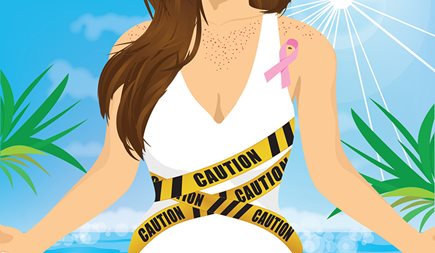Understanding the Breast Cancer - Melanoma Link
October is National Breast Cancer Awareness Month
 When Carol Mosier was a young girl in the 1950's and 60's, skin that was “golden” and “sun-kissed” was considered healthy. Even before a popular suntan lotion debuted in the 50's advertising itself as the way to a “faster, deeper tan”, Carol and her friends used baby oil to achieve glowing skin that was thought to be the picture of "health".
When Carol Mosier was a young girl in the 1950's and 60's, skin that was “golden” and “sun-kissed” was considered healthy. Even before a popular suntan lotion debuted in the 50's advertising itself as the way to a “faster, deeper tan”, Carol and her friends used baby oil to achieve glowing skin that was thought to be the picture of "health".
There’s No Such Thing as a Healthy Tan
These days we know that simply put, tanned, burned or sun-freckled skin is actually damaged skin which is at greater risk for wrinkles, brown spots, and skin cancer, including melanoma - the deadliest form of skin cancer.
Instead of the younger, fresher skin Carol and her friends thought they were enjoying as kids, it turns out it was actually those who practiced good sun protection who would enjoy healthier, more youthful skin later in life.
A fact Carol, 77, a former nurse knows painfully well. “I was diagnosed with my first melanoma in 2001 at 58. I’d gone to my dermatologist about a red spot on my chin. It turned out to be a basal cell carcinoma (non-melanoma skin cancer). However, my dermatologist said he was much more concerned about a spot on my shoulder, and biopsied it. It was melanoma.
“I can’t even count how many basal cell and squamous cell skin cancers and pre-cancerous lesions I’ve had treated since then. Three of the cancers were on my nose and lips. When I was in Virginia, a plastic surgeon was called in to help with my first facial cancer surgery to minimize the scarring.”
Since she’s lived in The Villages in Central Florida, Carol has been diagnosed with two more cancers on her face, and the dermatologists at Advanced Dermatology were able to use advanced Mohs surgery to remove those cancers and minimize scarring. “I was terrified of the cancer removal on my nose. Years ago, a friend had a cancer removed, and they removed half her nose. Things have changed tremendously since then.”
“I go for a Total-Body Skin Cancer Exam every six months, diligently,” said Carol. “I now wear sunscreen and SPF clothing whenever I’m in the sun.”
What Does Sun Exposure Have to do with Breast Cancer?
There was, however, one more important fact Carol didn't know. Not only did her time in the sun put her at greater risk for melanoma, it’s possible it put her at greater risk for breast cancer as well.
“I was diagnosed with breast cancer for the first time in 2002 and treated with a lumpectomy and radiation in 2003.
“In 2019, I was diagnosed with breast cancer a second time, and again underwent a lumpectomy and radiation.”
Recent information has shown there is a reciprocal link that increases the risk of breast cancer in women who have had melanoma and increases the risk of melanoma in women who have had breast cancer…a fact Advanced Dermatology is working hard to raise awareness about through national initiatives.
A 2004 study published in the International Journal of Cancer found that breast cancer survivors were 16% more likely to develop cutaneous melanoma than women who have not had breast cancer. And female melanoma survivors had an 11% increased risk of being diagnosed with breast cancer as second cancers.
More strikingly:
- “Among young [breast cancer] patients, investigators observed a 46% elevated risk of a second [cutaneous melanoma]. Women who underwent radiation therapy exhibited a 42% increased risk for [cutaneous melanoma].”
- The study also found that patients with a mutated BRCA2 gene, which increases risk for developing breast cancer, and those with a mutation on the melanoma susceptibility gene, CDKN2A, are both more likely to develop the other cancer compared to those without these gene mutations.
Early Detection is the Best Protection
For Carol, regular mammograms and Total-Body Skin Cancer Exams are crucial. “Early detection is the key. If cancer is caught early, it’s nothing to be afraid of. When I was going through radiation the first time, I was the director of a pre-school. I worked through the radiation and was back with the children after each treatment. I didn’t feel sick.
“Don’t be scared to get screened. If you get results that are positive, there are a lot of people who are out there to help you,” she added.
An Attitude of Gratitude
Carol’s positive attitude is contagious, and she is comforted by her faith. “God promises I will never leave you or forsake you. That has been so evident in my life. Even in the last few months. When everyone was looking for toilet paper, I had a friend who had extra and said take some. My husband had ordered some and it turned out to be 'toilet paper for midgets', so we were grateful for our friend's generosity. I keep a gratitude journal. Sometimes my entry has been just that I brushed my teeth by myself that day. But on that day I was grateful I could do that.
“Recently, I sent a birthday card to a friend. Later, I went to write a note, and the pad of paper had sparkles on it like the card did. I was grateful. There's so much we can all be grateful for.”
Don’t Delay: Get Your Annual Total-Body Skin Cancer Exam, Today!
Book an appointment online for your Total-Body Skin Cancer Exam, or call 866.400.3376. To learn how easy it is to have a Total-Body Skin Cancer Exam (TBSCE) download our TBSCE 2.0 brochure.